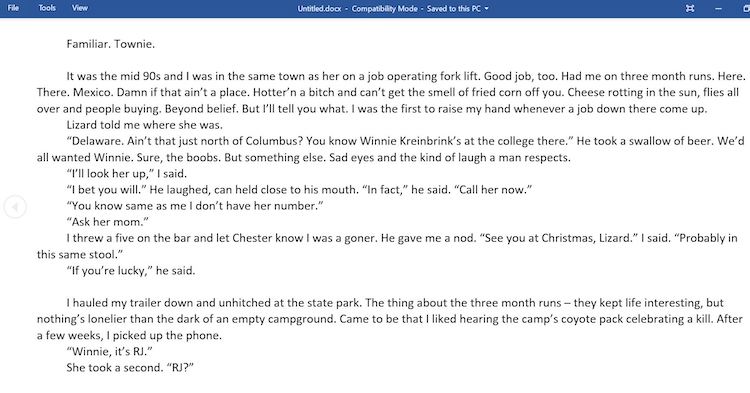Our Research Notes series invites authors to describe their process for a recent book, with “research” defined as broadly as they like. This week, Gwen Goodkin writes about A Place Remote from West Virginia University Press.
+
From Beginning to End: The Path a Story — and Its Book — Take to Arrive at Their Final Destination
 I describe the act of writing like this: I’m essentially a taxi driver. A story comes in and it’s my job to get it to its destination in the best way I can. And, like passengers, all my stories are different. They have different personalities which I hope are reflected in the story itself.
I describe the act of writing like this: I’m essentially a taxi driver. A story comes in and it’s my job to get it to its destination in the best way I can. And, like passengers, all my stories are different. They have different personalities which I hope are reflected in the story itself.
Not all stories start as ideas. Some start as a voice. That’s how “Winnie” began. I heard RJ’s voice. He was talking to me. He had a story he wanted to tell — a story he wanted me to tell.
I started writing “Winnie” in September 2012.

I asked myself, what was my life at the time? I had a 3 year old and a nine-month-old baby. Whew. Ask anyone, those are rough years. Then I thought about RJ and his voice — he has a calm voice, quietly confident, yet somewhat bewildered at how he pulled off where he ended up in life. And I can’t say for sure, because it was so long ago, but maybe in the midst of the chaos of young children, RJ’s voice in my head might have been the counterweight I needed.
I wanted to see what the first draft looked like, and with one eye closed, I opened the file. Much to my surprise, it wasn’t too far off the published version. I immediately knew why. RJ’s voice. That never changed. It was steady throughout. No matter how I altered or rearranged the story’s events, his voice was dependable and solid.

I put the story through a few revisions then sent it out to a handful of places, one of which was The Dublin Review.

I got an email back from the editor, Brendan Barrington, about a month later that essentially said, this story has some good things going for it, but a few aspects aren’t working. If you want to send a revision, here are some notes.
Here’s the revision file run for The Dublin Review:

As you can see, there was more than one revision. That’s because I fumbled the first revision. “Soap operatic” is the term I think Brendan used. I could tell from his note that he was irritated and disappointed that I’d made it worse. I asked him if I could try one more time and he agreed.
There was one scene in particular that wasn’t working. I kept trying different dialogue, different action, different anything, but I just couldn’t get it right. So I decided to scrap it completely. But I was left with a gap in the story. As I was working out what to do, a bit of advice from my grad school screenwriting instructor, Sioux Browning, came to mind: go outside. When a script feels claustrophobic or hemmed in, send your characters outside. So that’s what I did — and it worked.
I think Brendan was surprised and relieved I’d managed to save my sinking ship. We went through one more round of edits, proofs, then publication.

It isn’t often a story gets this much care and attention from a career editor. I was grateful not only for the experience but also for how much improved “Winnie” was in the end.
To that end, when it came time to assemble the collection, I wanted “Winnie” up front. Even though RJ’s voice is quiet — yet steady — the story has momentum. I knew it would pull the reader into the next story, “A Boy with Sense” — another quiet protagonist finding his voice. With each story in the collection, the narrator’s voice turns the volume up a notch louder, more insistent — or anxious — until the pressure finally breaks and we find ourselves in a story that breathes, “A Month of Summer.”
I wanted “A Month of Summer” to be different from everything I’d written up to that point. I wanted it to take its time unfolding. I also challenged myself to write a joyous story. I even put a reminder for myself up front. The story begins:
Once, between the stage of life when time moves slowly, like a child’s school day in winter, and the stage when time leapfrogs overhead, I sat atop a grey-and-white dappled horse in the middle of a city neighborhood surrounded by narrow homes with slick-tiled roofs and flower boxes offering blooms in all the colors of joy.
I arranged and rearranged the order of stories in A Place Remote many, many times, but, throughout the process, I rarely moved “A Month of Summer” from the end because its offering of joy and beauty felt like the right kind of closure for book — and the reader.
+++